Making decisions in times of uncertainty: How farmers in Mali are adapting to climate change
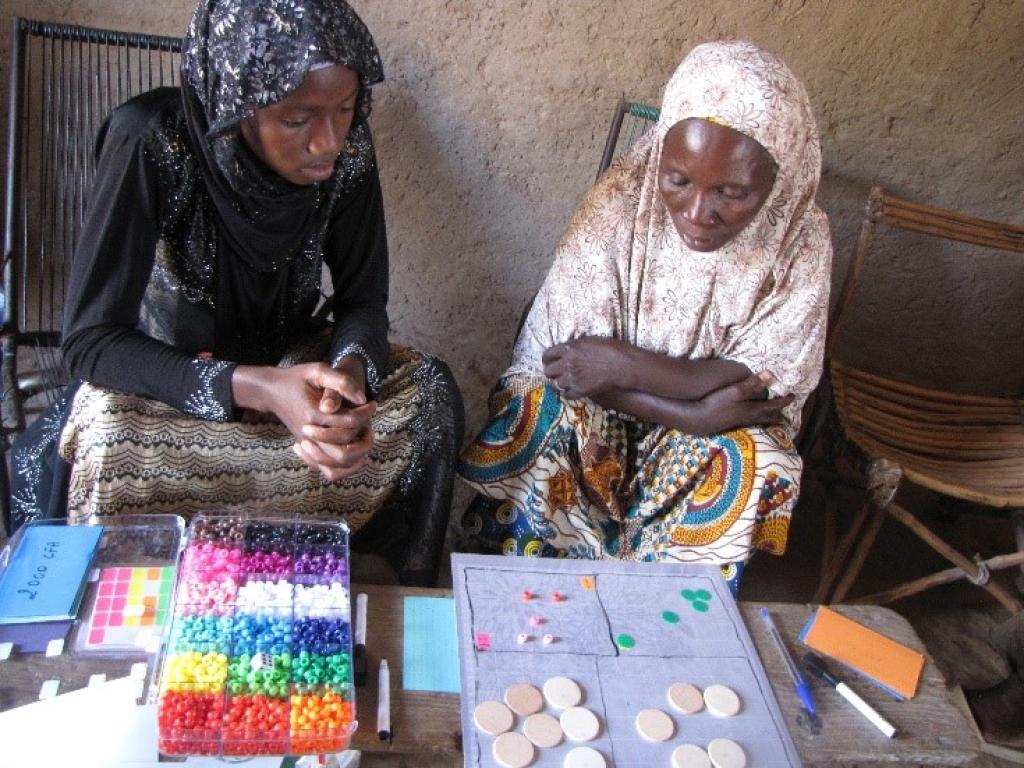
By Udita Sanga, researcher in West Africa
“The key to good decision making is not knowledge. It is understanding. We are swimming in the former. We are desperately lacking in the latter.” – Malcolm Gladwell
Consider these questions: Is climate change affecting agriculture and food security in Mali? If yes, how are farmers experiencing the impact of climate change? What impact do they consider more severe and in need of urgent attention? Do they want to adapt? How do they make decisions to adapt? What factors constrain these decisions? What factors enable these decisions? What can be done to leverage their capacity to adapt with these changes?
Will these decisions lead to impacts which will reduce their vulnerability to climate change in the future?
The ASSAR Small Opportunities Grant (SOG) enabled me to gain insights into some of the answers to these questions through the pilot testing of a role-playing board game ‘Food and Farm’ with farmers in southern Mali.
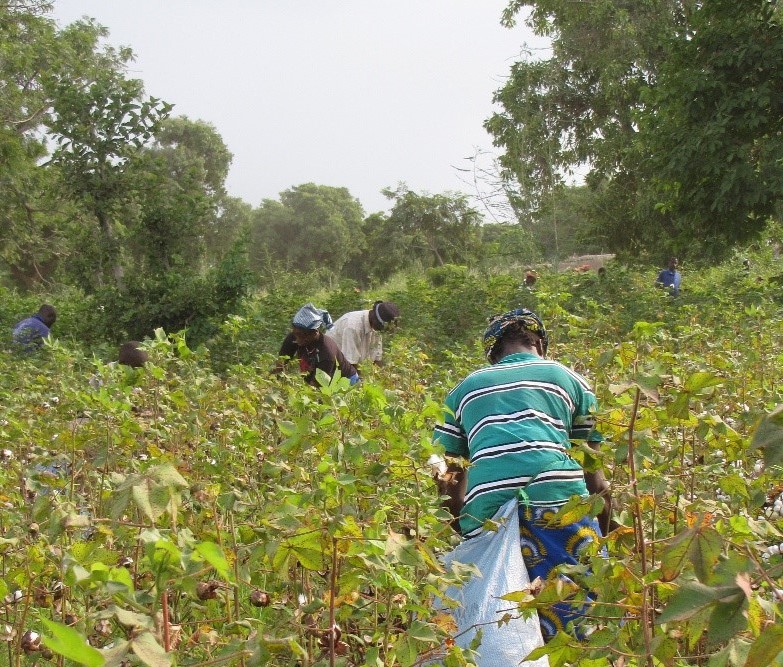
Photo credit: Udita Sanga - Malian farmers picking cotton in Koutiala.
Past studies on adaptation of Malian farmers to climate variability and droughts show that farmers have a high perception of climate change trends and have been using various adaptation strategies to adapt to these changes. However, the rate and magnitude of current and future climate change combined with high uncertainties make anticipatory adaptation very difficult and complex. Adaptation to climate risks involves decision-making under specific environmental conditions and hence, is extremely context-specific. Recently, the potential of role-playing games and participatory-modeling approaches to enable a deeper understanding of farmer decision-making within complex socio-ecological systems has been garnering a lot of attention by complex system modellers and researchers. These games simulate realities in a way that cannot be captured in surveys, and enhance our understanding of how humans make decisions and learn in complex, interactive and multi-stakeholder environments.
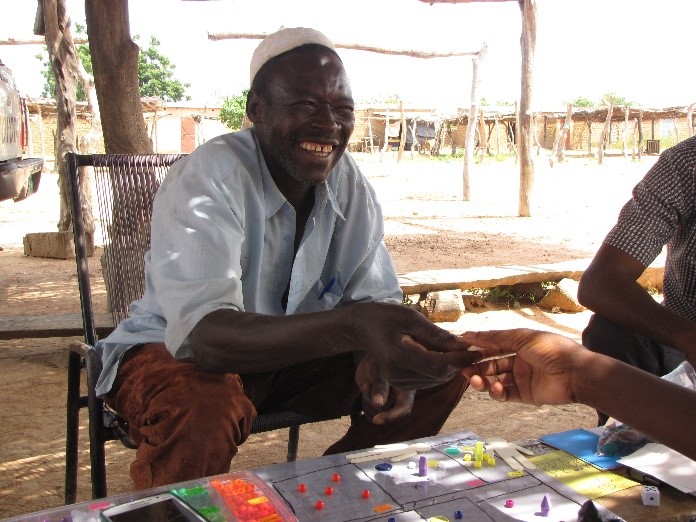
Photo credit: Udita Sanga - Research participants in Koutiala playing the ‘Food & Farm‘ game.
I have been interacting with the farmers in Mali since 2014 under a Michigan State University led Ensemble Modelling of Food Security project (funded by the National Science Foundation). Previous interviews conducted in 2015 with farmers in Koutiala district of Mali explored perceptions and the decision-making process of farming households around climate change and food security. Extensive narratives were collected from 44 respondents to assess decision, behaviour and risk perception with respect to food production, utilisation and consumption; as well as the impacts of and adaptation to climate change. We found interesting insights into the complex intra-household dynamics with respect to food security and climate adaptation. Men (elder and young) mostly decide on strategies for food availability and various adaptation strategies to be undertaken by the household while women (elder and young) decide on strategies for food utilisation as well as availability. Farmers identified highly-variable rainfall patterns, water scarcity, deterioration of land and soil quality and land degradation as some of the major climate stressors to farming in the area. Farmers reported that they adapt to these stressors by implementing various adaptation strategies, such as supplementing lean months with income from cash crops (cotton); selling cattle to pay for food; taking formal credit from banks; buying subsidised grains at low prices during lean seasons; informal lending among friends, relatives and village members; adopting new seed varieties (early maturing varieties); and crop diversification /growing cash crops.
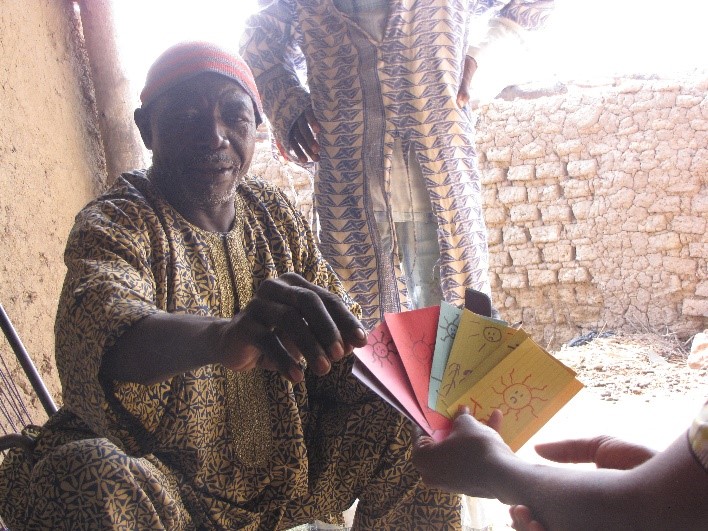
Photo credit: Udita Sanga - Research participants in Koutiala playing the ‘Food & Farm‘ game.
In the autumn of 2016, I developed a role-playing board game called ‘Food and Farm’ (also called ‘Dumuni ni’ Sene’ in Bambara) which is a one-player (plus game master) game that explores the dynamics of decision making under climate change adaptation. The game board was constructed with a square grid cell sheet where plots managed by the respective player were drawn and colour-coded to represent the different type of crops grown in the plots. Each game round simulated one crop production season. The players were also endowed with starting capital in the form of wooden coins to represent initial financial capital to buy seeds, inputs etc. The main objective of the player was to maximise the amount of good and nutritious food available to the player and her/his family for consumption and to maximise their income from farming. The game simulated the farming experience of smallholder farmers from food production to allocation to consumption. The game also simulated random climatic risk events that occur during a cropping season that influence the yield of crops and the food security status of the farmer and his/her family. Through the game, the farmers play out adaptation strategies to randomly drawn climatic event cards which enable me to observe changes in decision-making in real time as well as understand the social and institutional contexts that enable or constrain adaptation actions. The purpose of the game was not to identify the ‘best or optimal’ adaptation strategies but to understand decision-making behind the suite or plethora of adaptation strategies that farmers undertake, and the implications of these strategies. The board game was developed to quantify these decision structures and establish the decision heuristics and behavioural process on which an agent-based model on climate change adaptation will be developed.
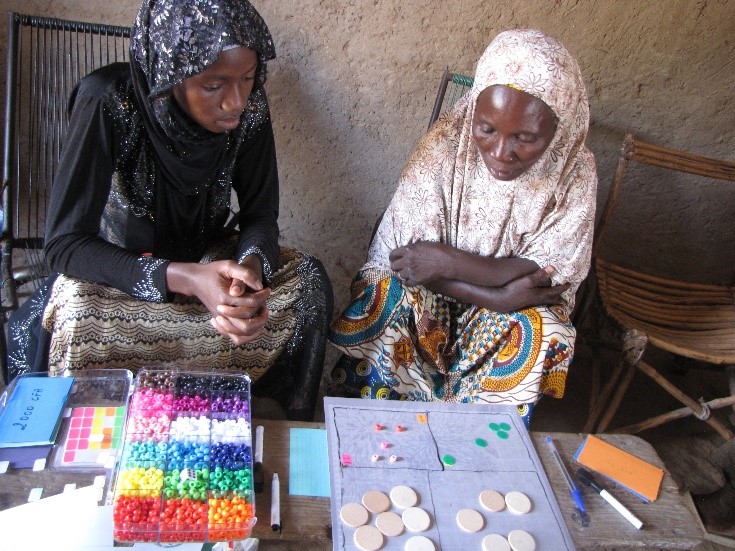
Photo credit: Udita Sanga - Research participants in Koutiala playing the ‘Food & Farm‘ game.
Reflections from piloting the game in Mali
Field work in Mali was conducted with support from Dr Amadou Sidibe, who is a long-term collaborator and scientist working at ICRISAT-Mali under the ASSAR project. The translation and mediation of the games was done with support from my field assistant, Ms Kadiatou Toure, who is currently a Research Technician at ICRISAT-Mali and pursuing a Master’s degree in Agricultural Economics. Kadiatou was given extensive training on how to moderate and translate the game from Bambara to English. I piloted and played the game with 25 respondents (nine pilot players in Bamako; eight male farmers in Koutiala; and eight women farmers in Koutiala) over a period of three weeks in October 2016.
Feedback from the players of the game
The game was received with much enthusiasm among the farmers who found it a fun, unique and novel way to interact with researchers. The rules of the game were developed by the players of the game (based on the reality in the field) and new elements were built into the game (based on each player’s recommendations). In a way, the farmers took ownership of how the game rules work, based on their experiential reality in the field.
The game enabled us to delve deeper into institutional and social aspects of climate change adaptation in terms of gender, land, seed and fertiliser access, credit and loan institutions as well as constraints faced by farmers for effective adaptation. Apart from serving as a data collection tool for us, the game also, unexpectedly, served as an educational tool for the farmers, who were able to use systems-thinking to assess how implemented adaptation strategies were helping them cope with climate variability, and identify areas where they needed further support. This is what one of the players of the game, Ayeshata Kone from Konseguela Village, had to say: “ I never thought I was making profit while farming, but now after playing this game, I know that I am a wise businesswoman.”
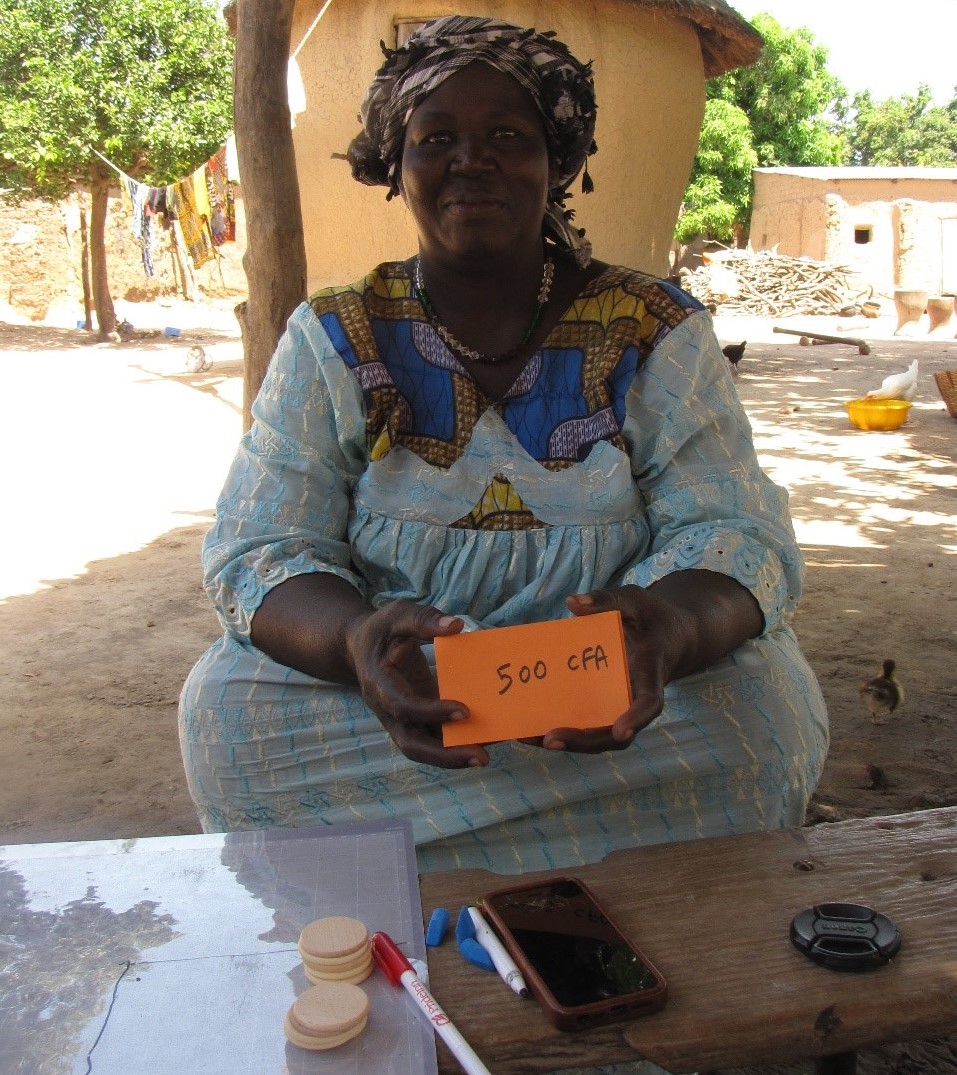
Photo credit: Udita Sanga - Ayeshata Kone from Konseguela, Koutiala, showing her winnings after the game.
CBIE Winter School on Modelling human-decision making in SES systems
Funds from the Small Opportunities Grant were also used to support my attendance of the International Winter School on ‘Modelling human decision making in Socio-Ecological systems’ in January 2017 at Arizona State University. The overall aim of the winter school was to enable participants to learn about the opportunities and challenges of implementing theories of human behaviour in agent-based models. As participants, we had the opportunity to explore a few behavioural models, reach a deeper understanding of various behavioural theories, and develop the ability to formalise more abstract notions in a specific programming language. The workshop was extremely beneficial for me to network and learn from other researchers, who are also interested in modelling human decision-making and behaviour. Through discussions and brainstorming with other participants and instructors at the workshop, I have been able to sketch out a framework for the analysis and modelling of the game data and am planning to work on it in the coming months.
Conclusion
This research is one of the very few empirically-based, participatory agent-based modelling studies currently being conducted on climate change adaptation and food security. Participatory methods allow local perception frameworks to emerge while also allowing policies to integrate with local contexts, needs and behaviours. The scope of this study is closely aligned with the objectives of the ASSAR project in assessing the strengths and weaknesses of current adaptation practices and policies, as well as advancing the understanding of the constraining and enabling factors that determine successful adaptation.